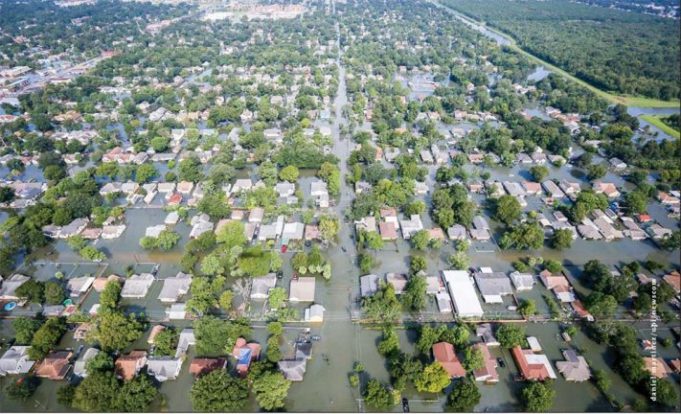Sewa International joins others of Houston’s 200,000-strong Indian community to help one another and their neighbors in the wake of unprecedented flooding
Heeding the urgent warnings, Gitesh Desai and his family—each carrying just a backpack—fled their Houston home as Hurricane Harvey flooded it with five feet of water on August 25, 2017. The family lost its precious collections of books and all the memorabilia on the first floor. Yet, when called at his hotel and asked how he was doing, he promptly responded, “This isn’t about me. There are many poor fellow Houstonians who need help from people like me. That is what I am trying to do through Sewa International.”
Gitesh is president of the Houston chapter of that relief and development organization. His normal role is to facilitate its responses to disasters overseas. Now he found his own family in the middle of the costliest natural disaster in recent American history and himself directing volunteer efforts from a local hotel room.
Texans knew they were in trouble when the weather forecasters started predicting rainfall in feet instead of inches. Rain from the slow-moving storm pounded Houston and other parts of Texas for a week. The area’s bayous—normally languid rivers meandering through the flatlands—burst their banks, drowning entire neighborhoods under several feet of water, affecting one in four Houston residents. An estimated 200,000 homes were destroyed or damaged in the state—50,000 of them in Houston. A million cars, abandoned to the floodwaters, were ruined. The Texas governor’s office estimated the economic damage at $180 billion and predicted rebuilding will take five years.

The deluge and aftermath: One colossal mess as flooded homes are emptied of ruined furniture, appliances, rugs and sheetrock
A report by Ramesh N. Rao, a professor at Columbus State University and member of Sewa’s media team, estimated that one in six of the area’s residents of Indian origin was directly impacted, including 10,000 forced to evacuate. A group of 247 students newly arrived from India to attend the University of Houston were trapped for two days in flooded apartments without electricity, food or drinking water as the winds howled outside. They were rescued by a group of Sewa volunteers, accompanied by the Consulate General of India in Houston, Dr. Anupam Ray.
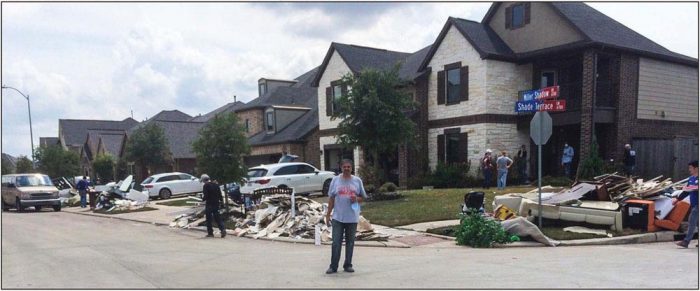
The deluge and aftermath: Flooded interiors must be stripped immediately and dried out to forestall the growth of ruinous molds
Sewa International (sewainternational.org/) is associated with Sewa Bharati (sewa means service), which started in India in 1979 as an NGO under the auspices of the RSS. The organization (see en.wikipedia.org/wiki/Seva_Bharati and rashtriyasewa.org) undertakes disaster rescue, relief and rehabilitation, development and many other social service projects. The Sewa movement has been involved in numerous relief programs, most recently the devastating floods in Gujarat in July, 2017, which inundated 800 villages and displaced two million people. Sewa International, founded in 1989 and headquartered right in Houston, has 41 chapters in the US and is active in 20 countries.
Their institutional experience and local presence made the agency the natural leader of relief efforts, joined by 25 national and local Indian-American organizations. Almost immediately, the Arya Samaj sent a check for $50,000. Volunteers and more donations came from the India Cultural Center of Houston, Hindus of Greater Houston, Hindu American Foundation, BAPS and many other organizations. Masala Radio in Houston managed to broadcast throughout the storm, passing on pleas for help to volunteers on the ground.
During the initial rescue and relief efforts, Sewa fielded 800 to 1,250 volunteers a day, including some of those stranded students from India who became inspired to help after their own rescue. Another 200 supported the efforts remotely, efficiently directing rescues from as far away as California through social media networks such as WhatsApp.
Sewa also joined with other faith organizations, including churches, synagogues and Buddhist temples. One Buddhist temple became a distribution center for relief supplies after Sewa helped it recover from the flood. Sewa distributed supplies provided by the Red Cross. Sharply criticized in recent years for an overemphasis on fundraising, high administrative costs and poor on-the-ground performance in actual emergencies, the Red Cross has responded in part by reaching out to local organizations like Sewa to get effective help to those in need.
The American Association of Physicians of Indian Origin contributed both medical assistance and money to the effort, and the Environmental Protection Agency—perhaps realizing any Indian-American effort would include a large number of doctors—provided medicines to prevent waterborne disease, a common consequence of polluted flood waters.
Sewa’s volunteers sprang into action as the extent of the disaster became apparent, even though many, like Gitesh, were victims themselves. Similarly, other religious organizations, including the Salvation Army and the Indian Muslim Association, rallied their members to help. The Sikhs helped in force, even though two of their own gurudwaras had to be evacuated because of flooding. All realized the disaster was far beyond the capacity of the Coast Guard, police, fire and other governmental rescue services.
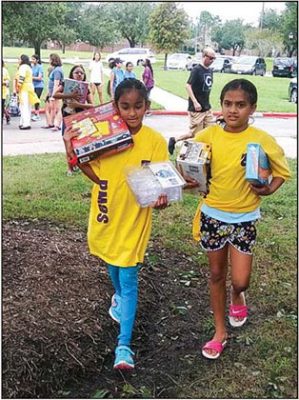
The deluge and aftermath: Volunteers of all ages pitched in
Volunteers waded door to door through standing water to find those in need, and organized boats to evacuate the neediest. In the first week and a half, Sewa delivered 1,000 hot meals a day to various shelters in downtown Houston and four suburbs—Cypress, Katy, Pearland and Sugar Land. Indian business owners provided ten trucks of food and supplies for 5,000 displaced people.
Kavita Tewary, project coordinator for Sewa’s Houston chapter (who had to be evacuated with her family), expressed the enormous emotional and physical energy that has gone into these rescue and relief efforts. “Our volunteers will need to go through therapy sessions,” she explained, “as they have seen so much trauma, and looked into the faces of people who are desperate, tired, afraid, and bereft, and who need help immediately.” Though her own home was not inundated, the area suffered much water damage. When she was able to return, she found out that she could not turn the water on for long, nor do laundry, etc, because the pumping stations and other public facilities were still flooded.
She described the situation: “There is debris piled high on both sides of the road, all over. Traffic is snarled. Families are crowded in apartments, and many are desperately looking for alternate living accommodation.” Schools have reopened, but children whose homes were destroyed or severely damaged find themselves under tremendous pressure to keep up with lessons, tests and the ordinary demands of school life. A friend’s child, Tewari told us, leaves for school at 7:30 am and cannot get home before 8:30 at night because the family had to leave their home and are staying with friends far away. The parents are struggling to meet the demands of work, parenting and rebuilding their homes.
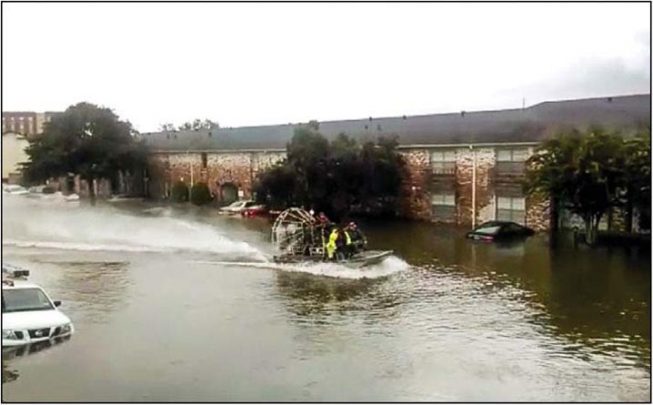
Welcome to the Great Lake of Texas: Almost 250 newly arrived University of Houston students from India were stranded in their apartment complex for two days without food, water or electricity
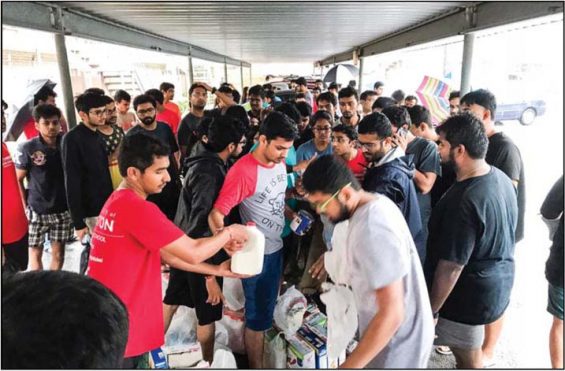
Welcome to the Great Lake of Texas: The local Indian community arranged delivery of food and evacuation of some
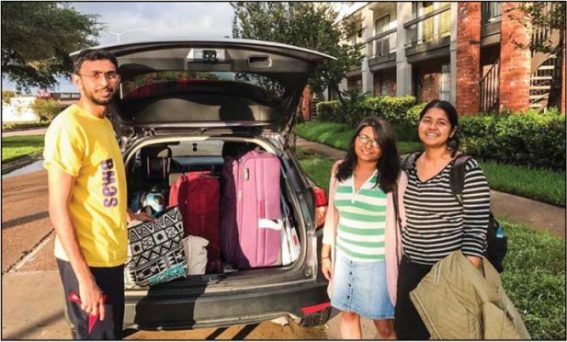
Welcome to the Great Lake of Texas: Two of the students being delivered to higher ground
As Houston enters the relief phase, nominally a three-month period but here expected to extend to five months due to the widespread devastation, thousands of flooded homes will continue to need cleanup efforts for many days and weeks to come. In response, Sewa International is fielding cleaning teams, each with a minimum of six volunteers. Each team is going around Houston to help the residents remove damaged drywall and other debris.
With the massive cleanup going on in the city, big stores like Home Depot and Lowe’s were running out of housecleaning and rebuilding supplies. Sewa International’s San Antonio chapter loaded two big vans with safety gear and building supplies and drove them down to Houston.
Sewa started counseling services and opened medical clinics to help families cope with the disaster. They organized activities to keep children engaged as parents struggle to put their homes and lives back in order. The agency is also helping families deal with flood insurance and building contractors. Experienced volunteers are helping stricken families apply for the Federal Emergency Management Agency aid that the US Congress recently approved. FEMA requires homeowners to file the form for aid consideration within 60 days of the disaster. Some attorneys have offered free consultation to anyone affected by the floods. They answer questions on insurance contracts, leasing contracts, and contracts with construction and clean-up companies.
As of October, 2017, Sewa International’s goal is to raise one million dollars and help clean and rebuild 1,000 homes. They have raised about half that so far, and have removed debris and damaged walls in about 500 homes. Rebuilding will begin once the homes dry out enough to forestall mold growth. To volunteer or make a donation, go to sewahouston.org
Reporting by Ramesh N. Rao, Virginia, and Sivakamasundari Shanmugasundaram, Michigan.
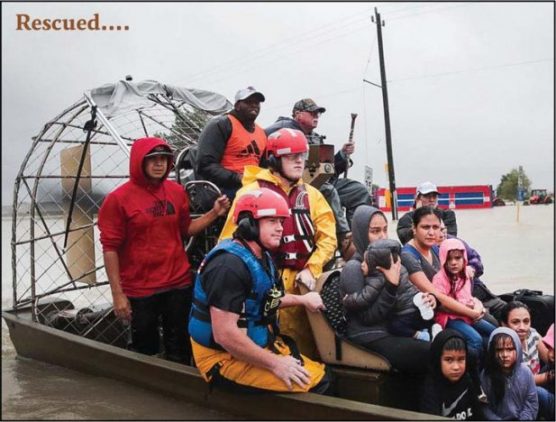
Fleeing the flood: An Indian-American mother and child (center, in pink parka) are rescued in a fan boat
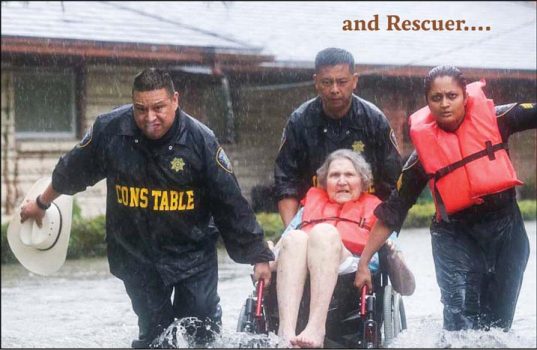
Fleeing the flood: Sergeants Radha Patel (at right), Paul Fernandez and Michael Tran of the local constable’s office rescue a wheelchair-bound elderly woman on August 27

Fleeing the flood: Volunteers serving at the Humane Society comfort displaced dogs; Sewa kitchen workers fed thousands
